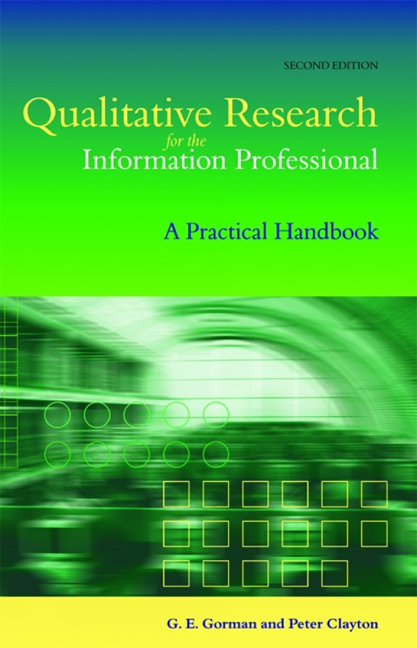Book contents
- Frontmatter
- Contents
- Tables, figures and research scenarios
- About the authors
- Preface to the second edition
- 1 The nature of qualitative research
- 2 Evaluating qualitative research
- 3 Qualitative research design in information organizations
- 4 Case studies in information organizations
- 5 Laying the foundations for fieldwork
- 6 Beginning fieldwork
- 7 Observation
- 8 Interviewing
- 9 Group discussion techniques
- 10 Historical investigation
- 11 Recording fieldwork data
- 12 Analysing qualitative data from information organizations
- 13 Writing qualitative research reports
- 14 Human resources in knowledge management: a case study
- Select bibliography
- Index
Preface to the second edition
Published online by Cambridge University Press: 08 June 2018
- Frontmatter
- Contents
- Tables, figures and research scenarios
- About the authors
- Preface to the second edition
- 1 The nature of qualitative research
- 2 Evaluating qualitative research
- 3 Qualitative research design in information organizations
- 4 Case studies in information organizations
- 5 Laying the foundations for fieldwork
- 6 Beginning fieldwork
- 7 Observation
- 8 Interviewing
- 9 Group discussion techniques
- 10 Historical investigation
- 11 Recording fieldwork data
- 12 Analysing qualitative data from information organizations
- 13 Writing qualitative research reports
- 14 Human resources in knowledge management: a case study
- Select bibliography
- Index
Summary
I asked him how his research was going. He said quite well, he had collected quite a lot of paradise references already. He took a notebook out of his shirt pocket and ran through the list: Paradise Florist, Paradise Gold, Paradise Custom Packing …. He had spotted these names on buildings or the sides of vans or in newspaper advertisements. I asked him if it wouldn't be simpler to look up the Honolulu telephone directory under ‘Paradise’, and he seemed rather offended. ‘That's not the way we do fieldwork,’ he said. ‘The aim is to identify totally with your subjects, to experience the milieu as they experience it, in this case to let the word “Paradise” impinge on your consciousness gradually, by a slow process of incrementation.’ I inferred that it would be improper for me to pass on any Paradise motifs I happened to come across, but he seemed prepared to stretch a point, so I told him about Paradise Pasta and he wrote it down in his little book.
In his inimitable way, David Lodge paints a picture of the classic qualitative researcher that is both true to form and light-hearted. This, we trust, sets the tone for this volume – formative and informative, but not self-important or without a sense of the absurd. One of the great disappointments in our lives as researchers is the unbearable pomposity of so many other researchers, who can be immodest, opinionated, jargon-driven, narrowly focused and utterly without any awareness of the fun that can be derived from research. For some reason this applies more to those in the qualitative mould than their counterparts in quantitative research. Consider, for example, the ethnographer who specializes in participant observ - ation of information seekers – surely he must see some wonderful vignettes of absurdity in information organizations, but how often are we regaled with these tales? Research is a serious business, but we need to keep it in perspective and to realize that, for most of our colleagues, it is not of ultimate significance. Rather, we have a mission to show information professionals that research is something that is inherent in our work, that it can be done in a spirit of simplicity and modesty, and that it can make a significant difference to how well we provide that service that is the essence of the information professions.
- Type
- Chapter
- Information
- Qualitative Research for the Information ProfessionalA practical handbook, pp. xv - xxiiPublisher: FacetPrint publication year: 2004

